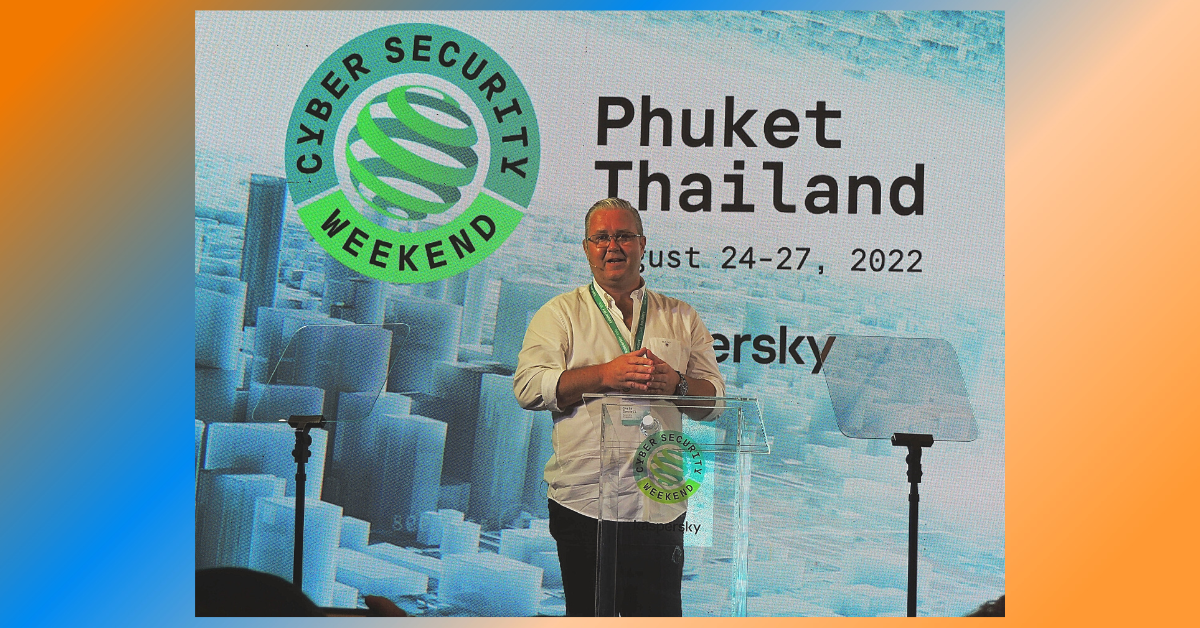We live in a world of “what if’s” and the certainty of many things is questionable. Who would have thought that two (02) years ago, the world will be at a halt, travel borders completely shut down, and digitalization will be accelerated at rates we never could have imagined?
Global cybersecurity and digital privacy company Kaspersky recently hosted the Kaspersky Asia Pacific Cyber Security Weekend 2022 in Phuket, Thailand. The conference served as a venue to meet and discuss cybersecurity threats, challenges, and the needed solutions to build a safer world.
“We believe in a tomorrow where technology improves all of our lives. Years ago, when it comes to cybersecurity, typically people think about anti-virus (endpoint protection solutions), and it is not anymore. It also includes threat intelligence, reporting, and common sense among many other things,” according to Chris Connell, Vice-President Global Sales & Managing Director for APAC at Kaspersky.
Right after the conference, I had the opportunity of sitting down with Connell to talk about how we Filipinos can contribute to making the world safer.
Education, Awareness & Responsibility
The biggest contributing factors to making the world safer are education, awareness, and responsibility according to the Kaspersky executive. As the world is changing every single day, it is the company’s job in making the world aware of the potential vulnerabilities, how organizations can recognize these vulnerabilities, what do you do when it does happen, and how to be responsible for the incident.
“Companies need not to make people panic and be scared. Over the years, cybersecurity is just another thing. The importance of cybersecurity has been recognized even pre-pandemic; this pandemic only advanced that (recognition) even more. More people are working from home and they are more vulnerable,” Connell said referring to what businesses need to do in the event that they encounter a cybersecurity incident. He also emphasized the need for employees to be fully aware of established company policies related to cybersecurity as it is not limited only to the use of computers. Among the common pitfalls of organizations when we talk about cybersecurity is human error.
To further increase cybersecurity awareness, Kaspersky has an online training platform that integrates simulation exercises with real-world scenarios. For students in primary school, the company is working with educational organizations in different countries across the region to make learning cybersecurity topics a fun activity — something that we need to look forward to once it reaches the Philippine shores.
Kaspersky on Transparency
Transparency is no longer an option but an absolute must according to Connell at the opening of the regional conference. Twenty-five (25) years ago, in 1997, Kaspersky introduced Heuristic Analysis Technology — a method of detecting computer viruses by examining code for suspicious properties — enabling their products at that time to detect and fight at least one (01) new malware every single hour. This technology was considered the game-changer in the computer industry as the development of new threats exploded towards the turn of the new century.
In July 2016, Kaspersky became one of the founding partners of the No More Ransom project aimed at helping victims of ransomware. A ransomware is a kind of malware that locks the victim’s computer and/or mobile device by encrypting one’s electronic files. The No More Ransom initiative now consists of almost 200 partners worldwide and helps victims of ransomware by providing decryptors and community-based technical support.
In 2017, the company launched the Kaspersky Global Transparency Initiative, making them the first cybersecurity company to offer its source code for third-party review. The project includes a number of actionable and concrete measures to engage with the wider cybersecurity community and stakeholders in validating and verifying the trustworthiness of its products, internal processes, and business operations. This year, Kaspersky reports having around 4,500 security professionals on board to create a security ecosystem to bring a cyber-immune future.
The cybersecurity firm also reported a 2021 global non-audited revenue of US$752M — the best by far in the company’s 25 years of existence.


